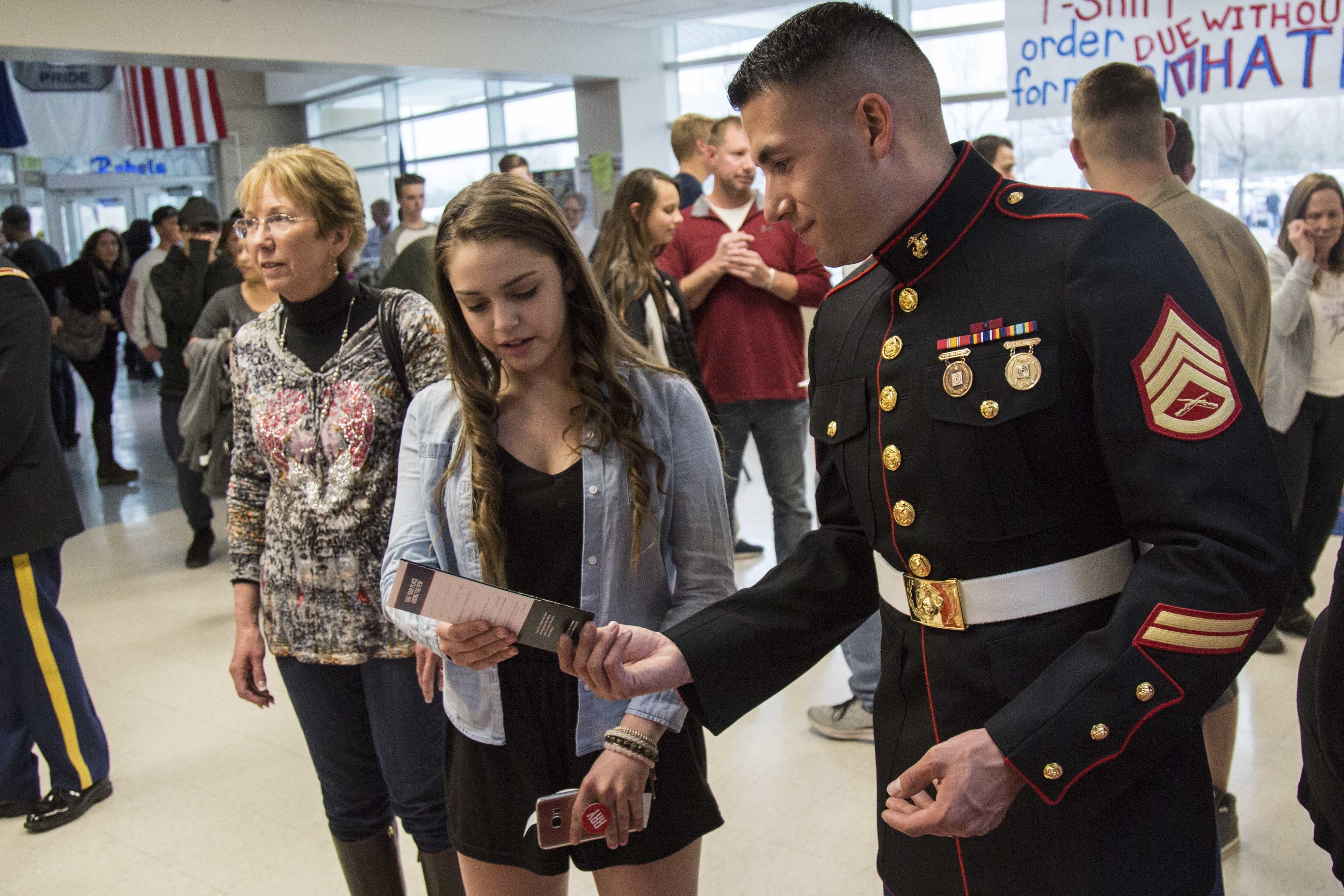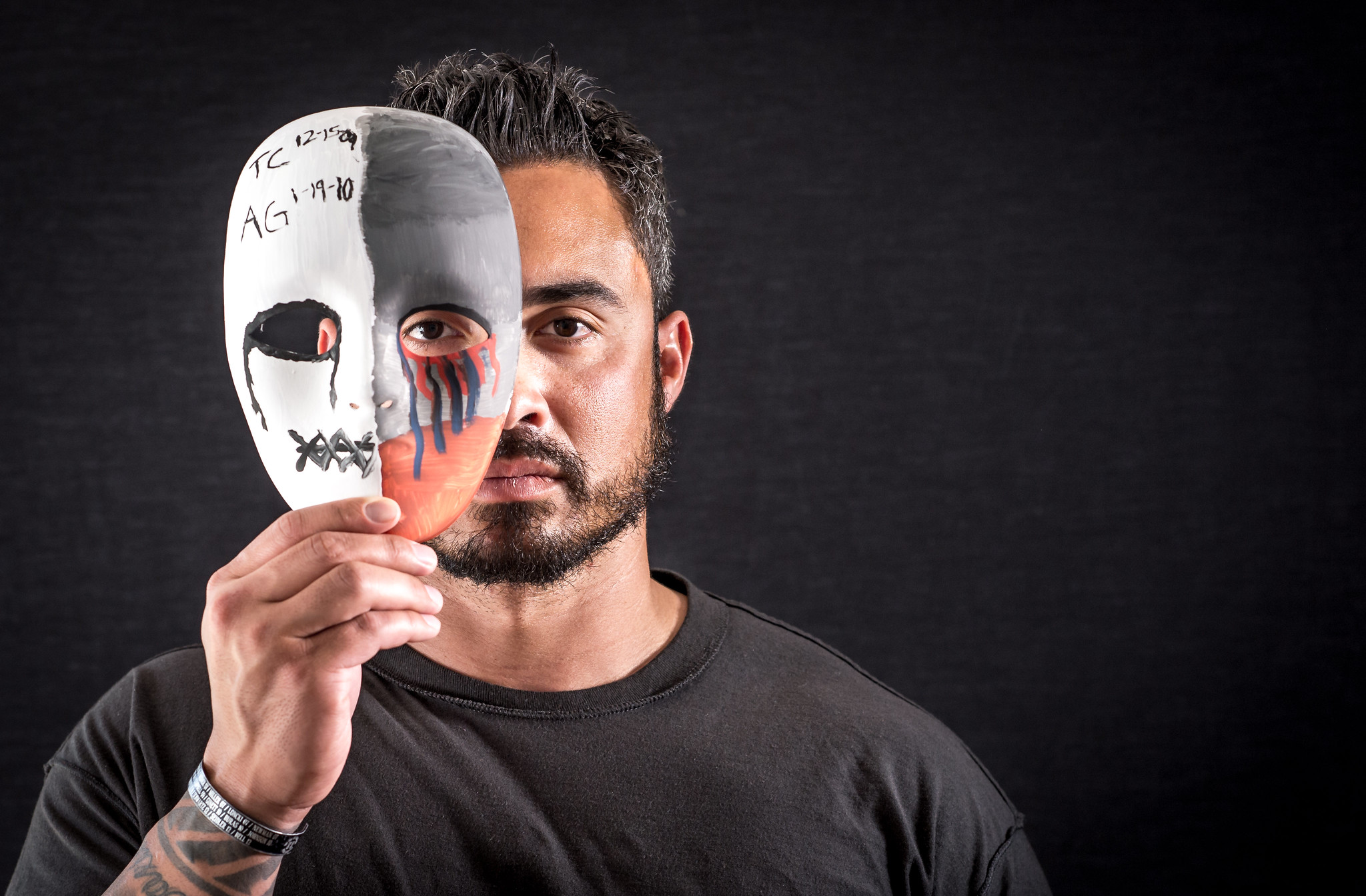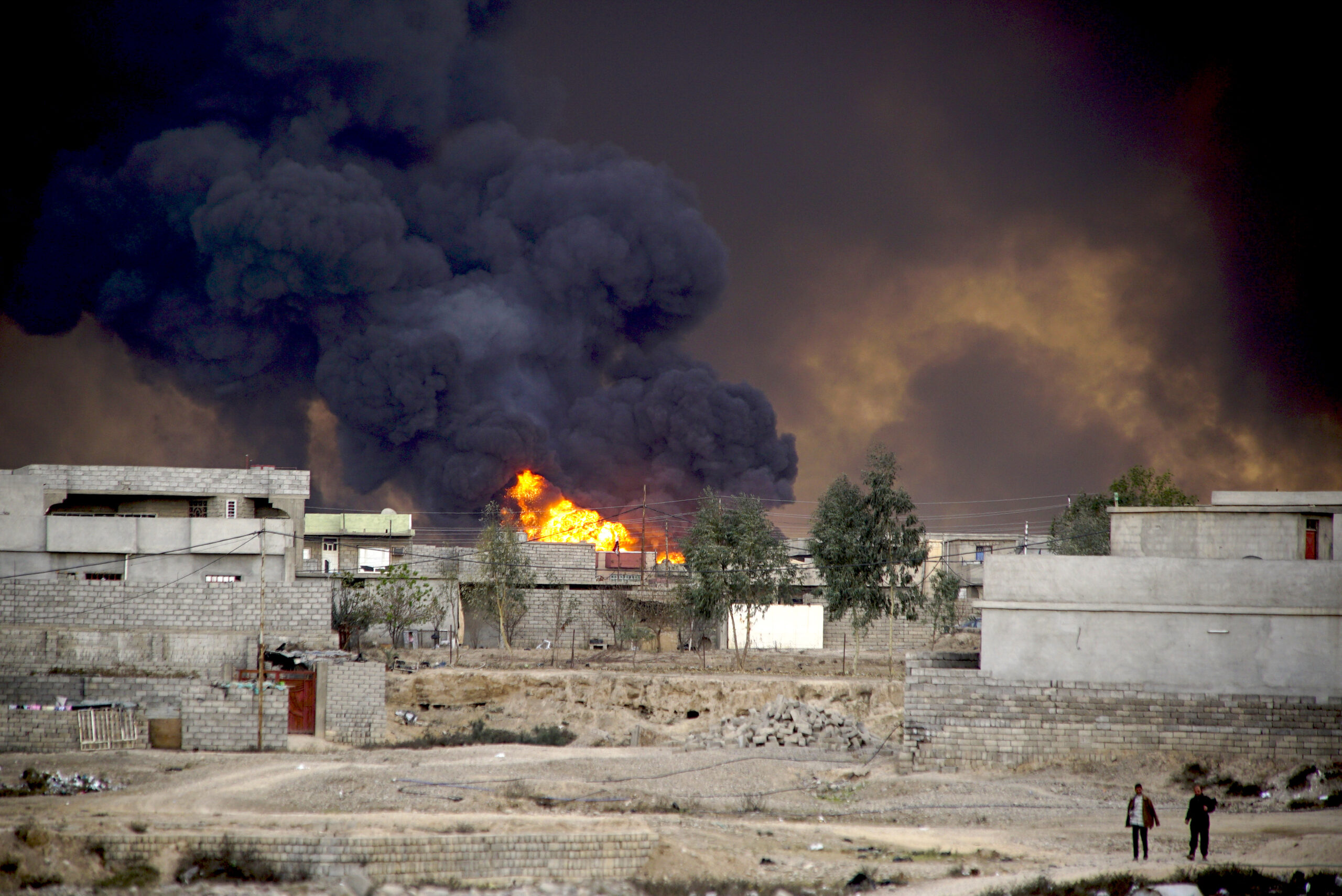Across the U.S., anti-war veterans and their allies are working together in an effort to stop the U.S. military from reaching its recruitment goals, writes Ruben Abrahams Brosbe.

Recruitment event at Columbine High School in Littleton, Colorado, 2017. (DoD/Benjamin Pryer)
By Ruben Abrahams Brosbe
Yes! Magazine
 March 20 marked the 20th anniversary of the United States’ invasion of Iraq. The war took hundreds of thousands of Iraqi lives, with some estimates of Iraqi casualties putting the number at over 1 million. More than 4,600 U.S. soldiers died in Iraq during and after the invasion, and thousands more have died by suicide.
March 20 marked the 20th anniversary of the United States’ invasion of Iraq. The war took hundreds of thousands of Iraqi lives, with some estimates of Iraqi casualties putting the number at over 1 million. More than 4,600 U.S. soldiers died in Iraq during and after the invasion, and thousands more have died by suicide.
[Related, How Team Bush Escaped Justice Over Iraq and IRAQ 20 YEARS: Joe Lauria — Covering the ‘Vial Display’]
Meanwhile, and not coincidentally, the U.S. military is facing its worst recruitment crisis since the end of the Vietnam War. The Defense Department’s budget proposal for 2024 outlines a plan for the military to slightly cut back on its ranks, but to reach its projected numbers, it will still need to embark on a heavy recruitment push.
Across the country, anti-war veterans and their allies are working together in an effort to stop the U.S. military from reaching its goal.
We Are Not Your Soldiers is a project of New York City-based nonprofit World Can’t Wait. The organization sends military veterans into schools to share honest stories of the harm they have caused and suffered. In doing so, they hope to prevent young people from signing up.
“I wish I had somebody who told me when I was young,” says Miles Megaciph, who was stationed in Cuba and Okinawa with the U.S. Marine Corps from 1992 to 1996. “The experiences I’ve lived, as painful as they are, and as much as I don’t like to relive them, are valuable to help future adults not live those experiences,” Megaciph told me.
“We wanted to get to the people who were going to be the next recruits,” says Debra Sweet, the executive director of World Can’t Wait. When We Are Not Your Soldiers launched in 2008, the experience was often intense for veterans.
“They were all fresh out of Afghanistan and Iraq,” Sweet remembers. “It was very raw, it was very hard. [It was] really hard for them to go talk to people in public about what had happened. And we learned a lot about PTSD, up close and personal, and how it was affecting people.”
Since then, over 50 veterans have participated in We Are Not Your Soldiers. Currently, the project relies on a group of nine veterans, who receive a stipend of $125 for each visit. Teachers affiliated with World Can’t Wait also offer curricular support to veterans so they can connect their stories to class lessons.
Sarah Gil, a school teacher at the City-As-School, a transfer high school in New York City, has brought veterans from We Are Not Your Soldiers to her classroom to speak to students in classes focused on just war, race and racism, economics, and moral responsibility. “They share their vulnerability, and it’s more than I could ever do with any of my lessons,” Gil says of the veterans’ visits.
Joy Damiani, an Iraq War veteran who served six years in the U.S. Army, has learned how to use that vulnerability more selectively over time. “I used to go into the classroom and spend a lot of time talking,” Damiani says. “[I was] trying to scare kids into not joining the military, because I was still so freshly traumatized from that.”
More recently, Damiani says her role is less about trying to scare young people and instead providing an alternative perspective. “I’m trying to respect these kids by telling them the truth that other people are not telling them. I’m trying to give them something I didn’t have, which was somebody to bring the real talk right into my face where I needed it.”
“Usually, the students don’t have any idea of what it’s actually like,” Megaciph says.
“Their narrative really comes from television and comes from the national narrative. ‘Thank you. Thank you for your service. It’s an honor to be a member of the military. Travel the world’ stuff.”
Shifting View of Military

A former explosive ordnance disposal technician suffering from PTSD and traumatic brain injury after combat tours in Afghanistan and Iraq displays a mask he painted in Hanover, Pa., 2017. (U.S. Air Force, J.M. Eddins Jr.)
While most students have a generally positive view of the military, Megaciph has noticed a shift in recent years. “I think in the past two years, maybe since the pandemic, there’s been a lot more talk about mental health in our country. And so, I think in the past two years, I’ve seen more students aware of the trauma that veterans have.”
Susan Cushman is a professor at Nassau Community College and Adelphi University on Long Island, where military recruiters have a heavy presence, particularly on the Nassau campus. She hosts veterans from We Are Not Your Soldiers to help her students “think about alternative ways to achieve an education and get a pension and get a job and travel, without feeling the only option is to join the military.”
A Piece of Property
In order to counter both the narrative and incentives that military recruiters offer young people, veterans try to share the truth about traumatic personal experiences as well as practical information.
“It’s very meaningful to hear from a veteran that when you enlist, that you are the property — literally are seen as the property — of the U.S. government,” Gil says. Damiani works to put the seemingly attractive military salary and benefits in context for students.
“Considering you’re on duty 24 hours a day or on call 24 hours a day, you’ve sold them your body, mind, and soul, essentially. You might not get it back.”
Megaciph also tries to place the role of the military in the context of broader social issues that he knows students care about, including police violence and climate change.
“The U.S. military is the global police, so I like to put that in the students’ head that the way that the police treat Black and Brown and poor people in this country is the way that the military treats people around the rest of the world,” he says. He also tells students that the U.S. military is the largest single contributor of greenhouse emissions in the world.

Qayyarah town on fire, in the Mosul District of northern Iraq, Nov. 2016. (Mstyslav Chernov, CC BY-SA 4.0, Wikimedia Commons)
Ultimately, stories told by veterans like Megaciph and Damiani can be an effective tool to disrupt the mainstream narrative about militarism. But is it enough?
Rick Jahnkow is a steering committee member and an administrative staff volunteer and organizer at the nonprofit National Network Opposing the Militarization of Youth (NNOMY). “Simply having veterans doesn’t take into account the way that military recruiters have been trained to convince young people to want to go in the military,” Jahnkow says.
“The recruiters have been trained to use basically psychological methods to turn people around if they’re being reluctant to enlist, and if a recruiter knows that a veteran has visited the same class, they have ways to negate that.”
The Pentagon’s Advantage
In addition to the military’s preparedness for counter-recruitment, there’s also the issue of simple math. The Pentagon has a multibillion-dollar budget for recruiting alone. By contrast, We Are Not Your Soldiers has an annual budget of $25,000. Meanwhile, Megaciph, Damiani, and the seven other volunteers are up against a much larger body of veterans who generally support military recruitment.
According to a 2019 survey conducted by Pew Research Center, 81 percent of post-9/11 veterans would advise a young person to join the military.
With these challenges in mind, NNOMY produced a video called “Before You Enlist!”
The 16-minute video seeks to lay out a case against military service that preempts the military’s psychological recruitment tactics. With veteran stories and statistics, the video debunks perks, such as “free education” and job training, that the military uses to appeal to potential recruits.
The video explains that college benefits are not guaranteed and a “general” discharge can completely disqualify a veteran from receiving benefits. Furthermore, a college education paid by the U.S. military still bears a cost, even if it is not financial.
As Matt Stys, a U.S. Army veteran featured in the video, says,
“You might not be paying monetarily, but you’re paying with your body, you’re paying with your soul, you’re paying with your mind.”
Other veterans share stories of struggling to find meaningful, well-compensated work after their service. According to a Bureau of Labor Statistics figure cited in the video, unemployment for young veterans aged 25 to 34 was 42 percent higher than for non-veterans of the same age.
The video also offers a way to bring this message into a greater number of classrooms given the limited number of veterans who are able to make classroom visits. Jahnkow also describes the video as a training tool to develop students’ critical thinking skills so they will be prepared to handle recruitment conversations themselves.
Also central to the video’s message is an explanation of the idea of the “economic draft” or “poverty draft.”
The video ends by directing viewers to Peaceful Career Alternatives.
Jahnkow and others explain that understanding the economic constraints of young people and offering alternative pathways is essential to counter recruitment efforts.
“I feel like empathizing with them is the first step,” Damiani says. “Acknowledging that right now they don’t have a lot of choices and the military offers a lot of at least money. It seems to them to be a lot. A $10,000 signing bonus sounds like a shitload of money to a teenager.”
The Education System
 Transforming the pre-K-12 education system is an important component of countering recruitment drives. The ways in which students are filtered and tracked into remedial courses starting from an early age has a limiting effect on their post-secondary options.
Transforming the pre-K-12 education system is an important component of countering recruitment drives. The ways in which students are filtered and tracked into remedial courses starting from an early age has a limiting effect on their post-secondary options.
Students who have been excluded from higher-level courses and the college and career pathways that accompany them become ripe targets for military recruiters.
Other resources educators can tap include texts like Roxanne Dunbar-Ortiz’s An Indigenous Peoples’ History of the United States and the Zinn Education Project, which present U.S. history with a more honest context.
Aside from creating more opportunities for poor and working-class students, targeting policy changes at the school and district level to protect students from recruitment is another important tactic.
Jahnkow cites victories by the Project on Youth and Non-Military Opportunities’ Education Not Arms campaigns to limit recruitment activity at schools that other communities could replicate.
At the same time, the curriculum itself has a role to play. Currently, the standard school curricula often valorizes war and soldiers, while leaving out the U.S. military’s historical role in genocide and colonization.
“You know, the Department of the Army was started for clearing Natives off their land and eradicating them, and that still goes on today,” Megaciph says, referring to the original Department of War established in 1789.
Lastly, veterans and organizers such as Jahnkow say there is an urgent need to build up the capacity of anti-war, anti-recruitment organizing. Damiani says that includes “finding ways to de-stigmatize sharing the dark side of the military so that more veterans, when they get out, feel safe and comfortable talking about the real shit rather than continuing to glamorize it.”
But growing the pool of veterans — and starting other counter-recruitment strategies — will take money. Counter-recruitment organizing efforts are severely underfunded, Jahnkow says.
At the same time, many counter-recruitment and anti-war organizations are being outmaneuvered by the military in digital and social media spaces. This is partly an issue of funding, but Jahnkow adds that the volunteer base for anti-war organizations also skews older.
Fighting recruitment online more effectively will require more younger volunteers with the skill set to use Instagram, TikTok, and other platforms in ways the counter-recruitment movement currently does not.
Meanwhile, Jahnkow believes that in today’s poor recruiting environment, the military will “pull out all the stops” in both digital and personal recruitment.
“I think it’s super trippy, that there are children who are old enough to be in the military and being deployed to Iraq, who were not born when the war started. That is something that is just devastating and tragic to me,” Damiani says. “It fuels my fire to keep talking to the kids, because they need to know.”
Ruben Abrahams Brosbe taught elementary school students in New York City public schools for 12 years. He currently facilitates workshops on racial equity and restorative justice for the Center for Racial Justice in Education and Ramapo for Children. He is also the editor for The Educator’s Room and a member of Jews for Racial and Economic Justice. He can be reached on Twitter.
This article is from Yes! Magazine.
The views expressed are solely those of the author and may or may not reflect those of Consortium News.

Read the Contract!
Nobody can become a member of the US Military until after having read and signed their contract of enlistment, a legally binding document.
I’ve always thought it was questionable that government agencies can use taxpayer funds to advertise to taxpayers. Now, there are even ads for the U.S. Postal Service. Say what? I wonder about the legality of it all.
As a Vietnam Veteran I applaud their efforts. I have advised all my grandchildren and friends children to go to school and avoid the military at all costs. I now ride a bicycle (touring cyclist) and have visited Vietnam on numerous occasions. My friends and I always come away with the same feeling – we should have never gotten involved. It’s also great to see how well Vietnam has evolved into a wonderfully friendly country.
Whilst I applaud the efforts being made to educate young people on the perils of throwing their lives away so dirty old men can become richer, nowhere in the story is a mention made at all of PARENTAL RESPONSABILITIES !
Where and WHAT is their parents views and concern for their offspring if they start talking of throwing their lives away by sigining up in the military, which will, without a doubt, destroy their future. I take note of military personel visiting Opp Shops and food banks to sustain their families as clearly, the salary from the Military is insufficient for them. This is not a secret, and has been publicly aired many times. I’m a veteran of the Vietnam war, though I’m not American, I did serve alongside Americans, and even way back then, finding a serving member who was “happy within the service” was very rare indeed. i have been posting many posts over the years, trying to highlight the dangers to young people, of surrendering their lives and well being to the state. Yet very few really want to listen to such FACTS. reminds me of the old saying we have in my country, “you can lead a horse to water, but you cannot make them drink”. IMHO, the same applies to young people these days who have plans to sign up, you can tell them of the folly of doing so until your blue in the face, then they’ll go out the door and sign on anyway.
It’s wild to see them recruiting at Columbine. only about 13% of males in the country have ever served in the military. But according to the National Institute of Justice (a government source), 28.5% of mass shooters had a military background. So if we weren’t teaching our children how to be cold blooded killers, maybe we could get those shootings down by half.
I am curious to know what proportion of schools permit anti-military veterans to have on-campus access to students.
Please watch and distribute the 16 minute video linked in this piece.
[hxxp://beforeyouenlist.org/]
A really good video bill. I liked the comment from one young man – “it’s like talking to the devil”.
The glamour of soldiering rubs off pretty quickly once the “professional killer” job settles down on the Privates. I would enlist if Mexico or Canada attacked the U.S.but not before. Definitely not to defend the Iraqis from Saddam, Libyans from Qaddafi, Russian from Putin etc.
These people are doing the lord’s work.
I hope that’s satire Dienne.
I think it depends on what Dienne refers to by “these people”.
glad to hear veterans are telling more students about the truth of the horrors of these endless wars. now who is going to tell the students about the truth of the horrors of the mis/dis-information present in the STATE school system??? like for example the FACT that we all belong to ONE race: humanity!
All the families of veterans, whether they live to get out of “military service” or not, are forever traumatized by the patriarchal “rules-based-order” of all power-over type hierarchical “chains of command.”
This does not even count the billions of deliberately and violently killed victims of our wars.
We will only be able to free ourselves into any kind of trust that recognizes peace is the surest real world- work which might save our “precious brothers and sisters” (Thx, Dr. Cornel West!) or our only home-planet, when we can see our “elitist industries” as the conglomerate murder machine we have somehow allowed.
To be created in our name.
As No Longer Legitimate.
The “military, industrial, congressional, media, academic, think-tank complex” (Thx, Ray McGovern!) needs recycling into useful environmental industry.
We now require the well-paid focus on teaching the loving skills of peace- creation. Cooperatives. Soil regeneration, food for human development, planetary health.
To teach skills on survival in this; the biggest transition. We do not yet, as a nation, have peace or survival as our “values.”
Yet, we have messengers who do show us this possibility daily…
Assange Must Be Freed.
And here we begin to deeply listen, to understand this, now and now…
Thank you, Joe Lauria. Your work inspires all of our own! Our words count. Our actions must too. Gratitude for all of you who speak, write, tell it true. Track Peace Acts. Pay all whistleblowers of conscience. What we pay attention to and chart may be monetized too. No? We can change, when we begin to learn why we ought to and how? How to.
Whether it’s in movies/TV or the military “pageantry” displayed at sporting events, popular culture is a powerful advertising vehicle for US imperialism. Glitz and glamour—–join NOW! —- 10K bonus!——- see the world.
Little do recruits know that indoctrination to the ways of the military include your entire personality/psyche first being broken down. The goal is to re-shape your mental makeup to turn you into a remorseless killer. You’ll be taught to de-humanize – both the “enemy” and yourself – and kill, kill, kill without thinking or guilt. ——-all done for the benefit of furthering US imperial objectives ’round the world.
—— Is it any wonder veterans are so mal-adjusted post “service”?? —-Or, that some 20-25 veterans commit suicide each and every day??
——– If these vets trying to enlighten young prospective recruits were to have much impact, the empire would find a way to criminalize their actions. Anti-American!! Giving aid and comfort to the enemy! Interfering with the legitimate business of the National Security State! ——does anyone doubt that?
Fun fact: One of the provisions among the billions of $$ in US tax revenues gifted to the arguably fascist Ukrainian regime was earmarked for “healthcare”.
“US Vets Try to Stop Students from Joining Up”
With no help from AOC…
March 2023 “Dozens of Bronx public school parents, teachers, students and community activists gathered on March 20, the 20th anniversary of the U.S. invasion of Iraq, to oppose a military recruitment fair, hosted by U.S. House Representatives Alexandria Ocasio-Cortez (AOC) and Adriano Espaillat, at Renaissance High School in the Bronx. The grassroots Bronx Anti-War Coalition organized the demonstration.”
-h/t workers dot org
AOC lied about the nature of the event, and smeared protesters outside the premises as “outside right wing agitators” Not only were protesters members of her own constituency, but some were actual former AOC campaign volunteers.
AOC has been fully assimilated by the neocon/neoliberal War Party.
To paraphrase George Carlin “It’s a big club and you ain’t in it” …. but AOC is.
One of the reasons the U.S. doesn’t have “Medicare-for-All” or universal healthcare coverage is bc this crucial benefit allows for military service to make for an attractive option for millions of young folks.
Clearly it’s not the only reason, but it’s not a small factor.
Another factor is student loan. Recently 16 congressmen wrote a letter to Biden to not cancel student loans because it may have a detrimental effect on recruiting for military. That says a lot.
Exactly! SL debt will ruin one’s life.
Thanks for this article. I wish you the best of luck, and hope that you can find ways to raise more funding for this important work. Battling Hollywood is no small task. It is a shame that movie makers have turned to war boosterism rather than teaching kids how the world really works. Hollywood has blood on its hands. It is shameful.
You’re right. I am from the generation of the Vietnam War and I was out protesting against that war when I was in high school and college. There was a draft then, and young men were determined not to sacrifice their lives for imperialism and we fought like hell to help guys escape to Canada.
Good for you Carolyn. I hope they never came back to the US.
Just to be clear, the Department of Defense [sic] essentially runs Hollywood, which is why we get endless movies and television shows which glamorize the military and its “civilian” counterparts.
Absolutely and so much of it is very subtle, so it’s difficult to understand it as propaganda. The military spends millions making sure the populace knows what a noble career it is.
But then there is the odd counter-balance such as “apocalyse now” and “catch 22”. Unfortunately not enough books are read.